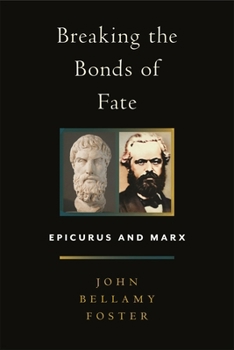Breaking the Bonds of Fate: Epicurus and Marx
The immanent dialectic of the ancient Greek materialist philosopher, Epicurus (341-270 BCE), helped inspire the nineteenth-century ideas of Karl Marx, forming the subject of his doctoral dissertation. Marx's detailed study of Epicurus led him to develop his own materialist dialectic in distinction to the idealist philosophy of G. W.F. Hegel. Until now, however, there has been no full scholarly treatment of the relation of Epicurus to Marx, paying equal attention to both thinkers and examining the long-term impact of Epicureanism on Marxist thought.
Breaking the Bonds of Fate: Epicurus and Marx fills this gap. Taking into consideration today's revolution in the understanding of Epicurus--resulting from the recovery of fragments of his major work On Nature in the carbonized papyri that survived the burying in volcanic ash of the Roman town Herculaneum when Mt. Vesuvius erupted in 79 CE--it demonstrates that this new interpretation corresponds closely to Marx's nineteenth-century treatment of Epicurus. The result is to fundamentally transform our contemporary understanding of both Epicurus and Marx.
Related Subjects
Philosophy




